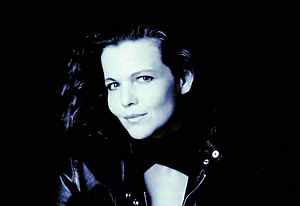Johanna Doderer facts for kids
Johanna Doderer was born on September 18, 1969, in Bregenz, Austria. She is a famous Austrian composer, which means she writes music. Her music includes everything from small pieces for a few instruments to large works for a whole orchestra, and even operas.
Contents
About Johanna Doderer
Johanna Doderer grew up in Bregenz, Austria. She comes from a family of creative people. Her great-uncle, Heimito von Doderer, was a well-known Austrian writer. Her great-grandfather, Carl Wilhelm von Doderer, was an architect who designed buildings.
Her Musical Journey
Johanna studied music in Graz with Beat Furrer, learning how to compose. Later, she continued her studies in Vienna with Klaus Peter Sattler, focusing on music for films and media, and with Erich Urbanner for composition.
She writes many different kinds of music. This includes chamber music, which is for a small group of instruments, and orchestral music, which is for a large orchestra. She also writes operas, which are plays set to music. Johanna plans to write even more operas in the future.
Working with Other Musicians
Johanna Doderer often works with other talented musicians. These include violinists like Patricia Kopatchinskaja and Edua Zadory, and singers like Marlis Petersen. She also collaborates with conductors, like Ulf Schirmer, who lead orchestras.
Her music has been performed in many places. For example, the violinist Édua Zádory and the Momenta Quartet performed her works at the Embassy of Austria in Washington, D.C. In December 2012, the University of Arts Graz in Austria dedicated a whole day to playing Johanna Doderer's music.
Awards and Special Opportunities
Johanna Doderer has received several awards and special opportunities for her music. These include:
- Composer in Residence (2004/2005): This meant she was a special composer working with the Wiener Concertverein orchestra.
- SKE Publicity Preis (2004): An award for her public recognition.
- Österreichisches Staatsstipendium für Komponistinnen und Komponisten (2002): A state scholarship for composers.
- Kulturpreis der Stadt Feldkirch (2002): A culture prize from the city of Feldkirch.
- Kulturpreis der Stadt Wien (Sparte Musik) (2002): A culture prize from the city of Vienna for music.
- Wiener Symphoniker-Stipendium (2001): A scholarship from the Vienna Symphony Orchestra.
Music Commissions
A "commission" is when an organization or person asks a composer to write a new piece of music for them. Johanna Doderer has received many commissions from famous groups, including:
- The Münchner Rundfunkorchester
- The Wiener Symphoniker (Vienna Symphony Orchestra)
- The Royal Liverpool Philharmonic
- The Brucknerorchester
- The Bregenzer Festspiele (Bregenz Festival)
- The Camerata Academica Salzburg
Music Recordings
You can find Johanna Doderer's music on several recordings:
- An ORF CD features her music with Ulf Schirmer and Patricia Kopatchinskaja. It includes pieces like "Bolero" for two pianos and orchestra, and "Rondane" for orchestra.
- The OEHMS Classics CD "Mon cher cousin" includes her piece for soprano and orchestra, also called "Mon cher cousin."
- The CAPRICCIO series "D2H-Dedicated To Haydn" includes her 2nd piano trio.
List of Musical Works
Johanna Doderer has written many different types of musical pieces. Here are some of them:
Operas
Operas are like plays where the story is told mostly through singing, with music played by an orchestra.
- Die Fremde (2000/01): An opera based on the ancient Greek play Medea.
- Strom (2002–06): Another opera inspired by an ancient Greek play, The Bacchae.
- Falsch verbunden (2006): A short opera.
- Der leuchtende Fluss (2009–2010): An opera with a long story.
- Fatima (2015): An opera especially for children, based on a story by Rafik Schami.
- Liliom (2016): An opera based on a play by Ferenc Molnár.
- Schubert's Reise nach Atzenbrugg (2021): An opera with a story by Peter Turrini.
Orchestral Works
These are pieces written for a large group of musicians playing together, called an orchestra.
- Second Symphony, "Bohinj" (2014/15)
- Study on Zaha Hadid's Painting "Vison for Madrid" (2008)
- DER GROSSE REGEN (2007)
- First Symphony (2006-7)
- Rondane (2001)
- Ikarus for string orchestra (1991)
Chamber Orchestra Music
This music is for a smaller orchestra, usually with fewer instruments than a full symphony orchestra.
- Psalm 2 (2006)
- Rondane (2000)
- Skumring (1995)
Concertos
A concerto is a piece of music where one or more solo instruments play with an orchestra.
- Violin Concerto No. 2, "In Breath of Time" (2012)
- Violin Concerto (2004/2005)
- Bolero for 2 pianos and orchestra (2004)
Chamber Music
Chamber music is written for a small group of instruments, usually one player per part, and meant to be played in a smaller room or "chamber."
- Second String Quintet (2008)
- Second Piano Trio (2008)
- Work for Cello and Piano (2005)
- Psalm 2 for string quartet (2005)
- Piano Trio (2002)
- running for percussion and piano (2001)
- Psalm String Quartet (1994)
Solo Works
These are pieces written for just one instrument or one singer.
- Wutmarsch - Fantasy for Piano Solo (2008)
- For Solo Violin 2 (2007)
- For Solo Violin (2005)
- Toccata for organ (2003)
Songs and Vocal Music
This category includes music written for voices, sometimes with instruments.
Solo Voice
- Mon cher cousin for soprano and orchestra (2007)
- Astraios for mezzo-soprano and chamber orchestra (2006)
- Orchestral songs on texts by Wolfgang Hermann for mezzo-soprano (2005)
- Mass for Wilhelm Doderer for 2 mezzo-sopranos and organ (2002)
- Terra for soprano and orchestra (1997)
- Der Verfall, a passion for soprano, choir and chamber orchestra (1991)
Songs with Piano
- Song Cycle (10 Songs) for soprano, baritone and piano (2009)
- Songs for baritone and piano on texts by Wolfgang Hermann (2003)
- Für ein Obdach am Rand aller Sinne for soprano and piano (2000)
Choir
- Three Choral Studies (2006)
- Vergessene Erde for choir (1995)


